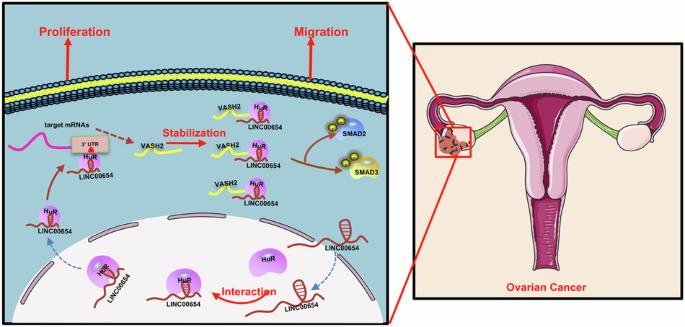LINC00654 promotes ovarian cancer progression by facilitating nuclear export of HuR and stabilizing oncogenic mRNAs
IF 7.3
1区 医学
Q1 BIOCHEMISTRY & MOLECULAR BIOLOGY
引用次数: 0
Abstract
Ovarian cancer (OC) remains a significant challenge in oncology due to its late diagnosis and poor prognosis. Emerging evidence suggests that long non-coding RNAs (lncRNAs) play critical roles in cancer biology. Herein, we reported that LINC00654 was highly expressed in OC tissues and correlated with poor patient prognosis. In addition, LINC00654 silencing restrained OC cell proliferation and migration in vitro and in vivo. Mechanically, LINC00654 was identified to directly interact with Human antigen R (HuR), a known RNA-binding protein, through RNA pull-down, RNA immunoprecipitation (RIP), and cross‑linking immunoprecipitation (CLIP). Further analysis revealed that LINC00654 could induce the translocation of HuR from the nucleus to the cytosol, where it regulated the stability of its target oncogenes, such as VASH2. The stabilization of VASH2 subsequently activated the TGF-β pathway, which is known to play a critical role in cancer progression. Taken together, these findings establish a specific mechanism by which LINC00654 interacts with HuR, facilitates its nuclear export, and stabilizes VASH2, thereby activating the TGF-β pathway and promoting OC progression. This insight into LINC00654’s role in OC provides potential therapeutic targets for intervention.

LINC00654通过促进HuR的核输出和稳定致癌mrna来促进卵巢癌的进展。
卵巢癌(OC)由于其诊断较晚和预后差,仍然是肿瘤学中的一个重大挑战。越来越多的证据表明,长链非编码rna (lncRNAs)在癌症生物学中发挥着关键作用。在此,我们报道了LINC00654在OC组织中高表达,并与患者预后不良相关。此外,LINC00654沉默抑制OC细胞的体外和体内增殖和迁移。机械上,LINC00654通过RNA下拉、RNA免疫沉淀(RIP)和交联免疫沉淀(CLIP)与已知的RNA结合蛋白Human antigen R (HuR)直接相互作用。进一步分析表明,LINC00654可以诱导HuR从细胞核转位到细胞质中,从而调节其靶癌基因(如VASH2)的稳定性。VASH2的稳定随后激活了TGF-β通路,已知TGF-β在癌症进展中起关键作用。综上所述,这些发现建立了LINC00654与HuR相互作用,促进其核输出,稳定VASH2,从而激活TGF-β通路,促进OC进展的具体机制。对LINC00654在OC中的作用的深入了解为干预提供了潜在的治疗靶点。
本文章由计算机程序翻译,如有差异,请以英文原文为准。
求助全文
约1分钟内获得全文
求助全文
来源期刊

Oncogene
医学-生化与分子生物学
CiteScore
15.30
自引率
1.20%
发文量
404
审稿时长
1 months
期刊介绍:
Oncogene is dedicated to advancing our understanding of cancer processes through the publication of exceptional research. The journal seeks to disseminate work that challenges conventional theories and contributes to establishing new paradigms in the etio-pathogenesis, diagnosis, treatment, or prevention of cancers. Emphasis is placed on research shedding light on processes driving metastatic spread and providing crucial insights into cancer biology beyond existing knowledge.
Areas covered include the cellular and molecular biology of cancer, resistance to cancer therapies, and the development of improved approaches to enhance survival. Oncogene spans the spectrum of cancer biology, from fundamental and theoretical work to translational, applied, and clinical research, including early and late Phase clinical trials, particularly those with biologic and translational endpoints.
 求助内容:
求助内容: 应助结果提醒方式:
应助结果提醒方式:


